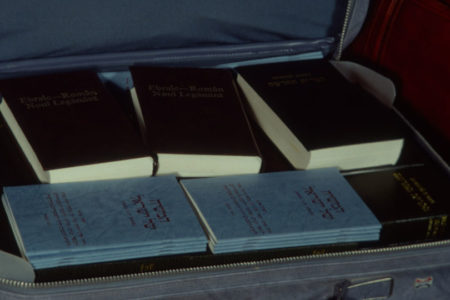Judgment Ahead Zephaniah 1:1–16
The 1990s will be a decade of unprecedented changes worldwide. Eastern Europe is swiftly evolving into a Western-style society. Western Europe will be sporting a new look known as the European Economic Community by 1992. The unification of Germany, unthinkable a few months ago, will soon take place—symbolic of the new day in Europe. World leaders are hoping that these international changes will precipitate global peace by the 21st century.
Similar political changes were taking place in Zephaniah’s day. New coalitions were being formed between nations in the East. Assyria and Egypt had become allied, as had the Medes and Babylonians. Assyria was on the decline as a superpower, and a Neo-Babylonian Empire was on the rise. There was a power vacuum in the East, allowing smaller nations like Judah to prosper politically and expand their military influence beyond national boundaries.1
Judah and neighboring nations desired such peace, power, and prosperity, but it was not to be. An obscure prophet named Zephaniah stepped on the stage of history and boldly announced that judgment, not peace, was soon to come, a time the prophet later called “the day of the Lᴏʀᴅ.”
Word to Judah
Zephaniah’s mission was to convey “The word of the Lᴏʀᴅ” (v. 1) to Judah, a word of unparalleled tribulation and destruction that the nations of the world and the people of Judah were to experience.
Zephaniah did not come from a common background. He had an aristocratic lineage and traced his pedigree through four generations of kings: “the son of Cushi … Gedaliah, … Amariah, … Hezekiah” (v. 1), thus making him the great-great-grandson of King Hezekiah. By mentioning his genealogy, Zephaniah distinguished himself from three other men who bore the same name (2 Ki. 25:18–21; 1 Chr. 6:36–38; Zech. 6:10, 14). It gave him credibility as a reformer like Hezekiah, who abolished idolatry from Judah, and revealed that he was a relative of King Josiah (640–609 B.C.), in whose reign he prophesied (v. 1).
Scholars are divided on whether Zephaniah prophesied before or after the religious reforms of King Josiah. Internal evidence seems to suggest that he prophesied just before those reforms, which occurred in 622 B.C.
Wrath of Jehovah
Before launching into his message on Judah’s judgment, Zephaniah revealed that God is the Judge of the earth, thereby establishing the power and scope of God’s judgment. Ultimately the Lord “will utterly consume [sweep away] all things from off the land” (v. 2). All life associated with the earth will be destroyed—man, beast, fowls, and the fish of the sea (v. 3). Interestingly, the prophet described the various forms of life being destroyed in the reverse order of their creation. Zephaniah went on to say that when judgment came, God would destroy “the stumbling blocks [ruins] with the wicked” (v. 3). This phrase could be interpreted in either one of two ways. Some believe the earth will be in ruin or rubble when God removes the wicked from it. Others hold that “stumbling blocks” are those religious rites and objects used in idolatrous worship, and God will remove them with the wicked at the time of judgment. The latter view best fits the context.
God reemphasized, “I will cut off man from the land” (v. 3). There is an interesting word play between man (Heb., adam) and land (Heb., adamah). Man, who was created from the land, whose life was sustained by it, and who brought about its curse through his sin, will be removed from the land by God’s universal judgment.2 The certainty of this judgment is confirmed by the words “saith the Lᴏʀᴅ” (v. 3).
The ultimate fulfillment of this judgment will take place at the end of the Great Tribulation when the earth will be almost totally entrenched in idolatry. During this time the world will worship (Rev. 13:8) the Antichrist (Rev. 13:1) and his image (Rev. 13:15) as God (2 Th. 2:4). Although God will bring universal judgment upon the wicked during this period, He will spare a righteous remnant (Zeph. 3:9–13) from being consumed.
The word consume is used three times in verses 2 and 3, presenting a picture of a person sweeping a building clean, bundling up the worthless items, and hauling away the debris to be buried or burned.
Peter revealed that during the Day of the Lord, “the heavens shall pass away with a great noise, and the elements shall melt with fervent heat; the earth also, and the works that are in it, shall be burned up” (2 Pet. 3:10). Ultimately the Lord will dissolve the physical elements of the earth, along with all its sinful deeds, by means of fire. In its place will appear the “new heavens and a new earth, in which dwelleth righteousness” (2 Pet. 3:13).
Wickedness of Judah
Zephaniah abruptly switched the emphasis of his prophecy from worldwide judgment to the coming punishment of Judah. God said. “I will also stretch out mine hand upon Judah, and upon all the inhabitants of Jerusalem” (v. 4). Judah had felt God’s “mighty hand, and … outstretched arm” (Ex. 6:6; Dt. 26:8) when He delivered her from the Egyptians. But now God’s privileged people (Dt. 4:7–8; 7:6; 33:7–14; Rom. 9:4–5), because of their wickedness, would be destroyed by His hand (Jer. 21:5–7).
The prophet named five types of wickedness for which Judah would be judged. First, they were guilty of the sacrilegious worship of Baal (v. 4). The name Baal means master or Lord and is often used synonymously with idolatry. Describing the vile worship of Baalism, Dr. Barber wrote,
In the Canaanite pantheon, Baal was the son of El. He was the god of fertility as well as the god of the storm and of war. His worship was extremely sensual. Open immorality was practiced “on every high hill” and “under every green tree” (I Ki. 14:23). Baal’s sister-consort was Anat, sometimes referred to as Anath. Her characteristic complemented his. Religious or “sacred” prostitution was practiced in her name by the priestesses connected with her temples. All of that was done to ensure the fertility of the earth and an abundant harvest. It was believed that if Baal and Anat saw humans cohabiting on the earth, they would be reminded of their own conjugal responsibilities. Their cosmic union would then produce on earth bountiful crops and increase the size of flocks and herds.3
God strongly condemned these abominable practices. His Law clearly taught that the land itself would vomit out the Canaanites (Lev. 18:25) for such practices, and if Israel did not heed God’s warning, the land would spew her out as well (Lev. 18:28).
Zephaniah foretold that God would also “cut off … the name of the Chemarim with the priests” (v. 4). The name Chemarim (idol-priests) refers to foreign priests brought into Judah to conduct Baal worship. Zephaniah also prophesied that no form of Baal worship would remain in Judah after God’s judgment. Although King Josiah tried to rid the land of idolatry (2 Ki. 23:4–24), it later reappeared, but the Babylonian captivity (586 B.C.) eventually rid Israel of idol worship forever.
Second, there were those in Judah who practiced Sabaism by bowing down to the “host of heaven upon the housetops” (v. 5). They erected family altars on the flat roofs of their homes and burned incense in the morning and evening to the sun, moon, and stars (Jer. 19:13; 32:29).
Judah was also guilty of worshiping the “queen of heaven” (Jer. 7:18; 44:17, 19, 25), who was probably the goddess Ashtoreth (equivalent to the Babylonian-Assyrian goddess Ishtar, the Canaanite Astarte, the Greek Aphrodite, and the Roman Venus). She was the goddess of sensual love, maternity, and fertility, and licentious worship was conducted in her honor. The great King Solomon erected idols to this goddess in Jerusalem (1 Ki. 11:5), and the wicked King Manasseh reestablished worship to her years later (2 Ki. 23:13). In Scripture she is called Ashtoreth instead of Ashtaroth, her ancient name. The writers of Scripture altered her name, giving it the vowels of their word for shame.4
The Law condemned such practices (Dt. 16:21–22; 17:2–5; 2 Ki. 17:16). The sin of stellar worship contributed heavily to the collapse and ultimate destruction of the ten tribes of Israel (722 B.C.). With such knowledge at hand, it is reasonable to assume that Judah’s kings would not have become involved in Sabaism, but such was not the case.
Of those Americans who are involved in astrology, most deny that they worship the stars; however, many who practice astrology do not begin the day without first consulting their horoscope and gearing the day according to its predictions. This holds true for many evangelical Christians as well. For example, one writer has revealed,
In 1975 a Gallup poll indicated over 32 million Americans believed “that the stars influence people’s lives” and … many of them consulted their daily or weekly horoscopes … a Gallup poll in 1984 revealed that among teenagers (aged 13–18), 55% believed in astrology … A 1988 Gallup poll indicated 10% of evangelicals believe in astrology … Astrology is the subject … of millions of books in print. Since 1960 the annual production of new titles has doubled every ten years … Over 80% of all U. S. newspapers now carry horoscope columns … Astrology is estimated to be anywhere from a $200 million to a one billion-dollar-a-year industry.5
If God judged other nations for trusting in the stars for divine guidance, He may also judge our nation for the same sin.
Third, Judeans were guilty of syncretistic worship, for they swore to the Lord as well as to Malcam (v. 5). The Judeans were binding themselves to God by an oath, while at the same time calling upon Malcam as god.
The name Malcam is synonymous with Molech (Lev. 18:21) and Milcom (1 Ki. 11:5), the national god of the Ammonites. They believed him to be a protecting father and honored him by sacrificing their children to him (Jer. 32:35). Although the worship of Molech was forbidden in the Law (Lev. 18:21; 20:1–5), Solomon built an altar to him at Topheth in the Valley of Hinnom, and Manasseh honored him through idolatrous orgies and the sacrifice of his own son (2 Ki. 21:6). King Josiah desecrated the altar in the Hinnom Valley (2 Ki. 23:10), but Jehoiakim later revived the cult (2 Ki. 23:37).6
Although such evil types of worship are not practiced today (with the exception of Satanism), many people are syncretistic in their beliefs. Some people who claim to be Christians are involved in organizations that embrace ancient religious systems condemned in the Bible.
A modern-day form of syncretistic belief is practiced in the Masonic Lodge, a fact that has recently come to light through the research of John Ankerberg and John Weldon. They wrote,
The Masonic Lodge teaches in the Royal Arch degree that it knows the true name of God. The candidate is instructed that from now on the true name of God is Jahbulon … The term Jahbulon is a composite term for Jehovah (Jah), Baal (Bul or Bel), and Osiris (On, a corruption of Os).
Masonic authorities such as Coil and The Masonic Ritual and Monitor admit that “Bul” or “Bel” refers to the Assyrian or Canaanite deity Baal and that “On” refers to the Egyptian deity Osiris. Wagner reveals the Masonic goal in this pagan trinity: “In this compound name an attempt is made to show by a coordination of divine names … the unity, identity and harmony of the Hebrew, Assyrian and Egyptian god-ideas, and the harmony of the Royal Arch religion with these ancient religions. This Masonic ‘unity of God’ is peculiar. It is the doctrine that the different names of gods [such as] Brahma, Jehovah, Baal, Bel, Om, On, etc., all denote the generative pro-creative principle, in that all religions are essentially the same in their ideas of the divine.”7
Masons would not think of incorporating Baal worship into their beliefs or practices, but they follow a syncretistic-type teaching by combining the above mentioned gods with the true God of the Bible. Such practices are condemned by God.
Fourth, there was a group within Judah who separated from God; they were “those who are turned back from the Lᴏʀᴅ” (v. 6). These people knew the Law and had at one time worshiped God, but eventually they became apostates. The word apostasy means to fall away—a deliberate and total abandonment of the faith previously professed but not possessed. Such a falling away was evident in Zephaniah’s description of Judah’s religious practices.
It is apparent that apostate teachings are finding fertile ground in which to germinate through some churches and seminaries today. A report in Redbook magazine revealed that in a survey of ministers in training, “56% rejected the virgin birth, 71% rejected life after death, 54% rejected the bodily resurrection of Jesus Christ, and 98% rejected Christ’s return to earth.”8
Fifth, there were secularists, “those who have not sought the Lᴏʀᴅ, nor inquired for him” (v. 6). Although this group was not involved in evil worship, they were indifferent to religion altogether. The same could be said of many Israelis today. About 45% are secular Jews and do not practice their religion. In the United States, the number is even higher; at least 55% of the Jewish population is not affiliated with a synagogue. Even a higher percentage of Gentiles in America are secularist and do not practice any religion.
Yet there seems to be a new trend emerging in America. Many secularists, longing for meaning to their existence, have turned to religious experience. All too often, however, they become entangled in the popular religious fads of the day—cults or the occult—which ultimately leaves them unfulfilled. In the 90s the religious fad is to embrace the New Age Movement, which is steeped in Eastern philosophical religious mysticism.
Within 50 years of Zephaniah’s prediction, judgment fell on Judah. Her judgment was total, her captivity complete, nothing went untouched when the Day of the Lᴏʀᴅ came.
Zephaniah’s prophecy is a mirror of the spiritual and moral declension we sense taking place in America. Could it be that the Day of the Lᴏʀᴅ is about to appear on the horizon of this country?
ENDNOTE
- John D. Hannah, The Bible Knowledge Commentary, Zephaniah (Wheaton, IL: Victor Books, 1985), 1523.
- Theo Laetsch, The Minor Prophets, Zephaniah (St. Louis, MO: Concordia Publishing House, 1956), 355.
- Cyril J. Barber, Everyman’s Bible Commentary, Habakkuk and Zephaniah (Chicago, IL: Moody Press, 1985), 91.
- Merrill F. Unger, Unger’s Bible Dictionary, Ashtoreth (Chicago, IL: Moody Press, 1957), 412-413.
- John Ankerberg and John Weldon, The Facts on the Masonic Lodge (Eugene, OR: Harvest House Publishers, Inc., 1989), 31.
- Merrill F. Unger, The New Unger’s Bible Dictionary, Molech (Chicago, IL: Moody Press 1988), 488.
- John Ankerberg and John Weldon, The Facts on the Masonic Lodge (Eugene, OR: Harvest House Publishers, Inc., 1989), 31.
- T. Wilson Litzenberger, Startling Trends in Our Generation, Religion ( Broadview: Gibbs Publishing, 1974), 172-173.








